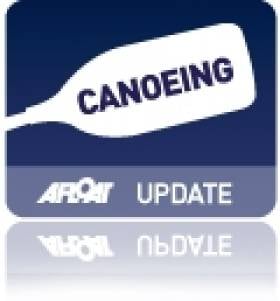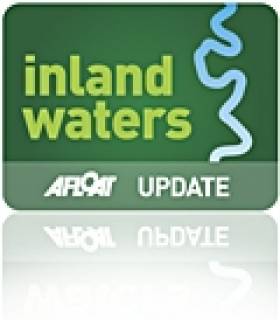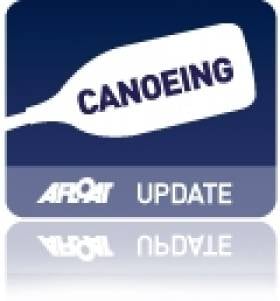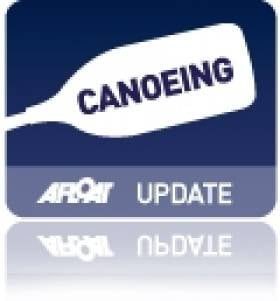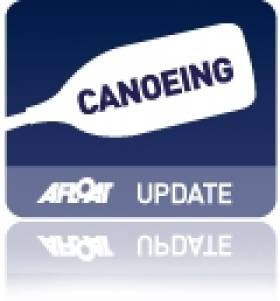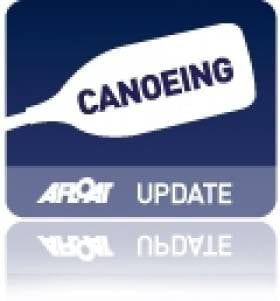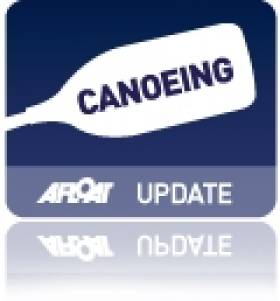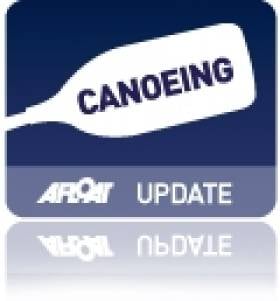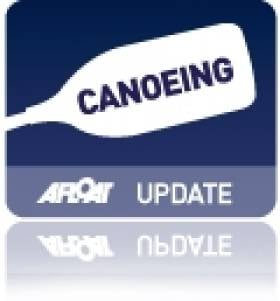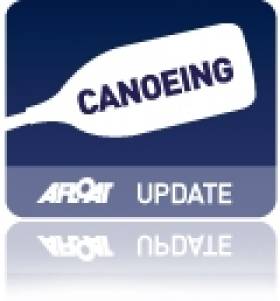Displaying items by tag: canoe
O'Leary Fourth in World Cup Final in Duisburg
#CANOEING: Ireland’s Pat O’Leary had to settle for fourth at the Canoe Sprint World Cup in Duisburg, Germany today. The paracanoeist qualified for the final of the KL3 on Thursday. Germany’s Tom Kierey won, from Artem Voronkov of Russia and Britain’s Timothy Lodge – who was just .595 of a second ahead of O’Leary, who had also finished fourth at the European Championships earlier this month.
Canoe Sprint World Cup, Duisburg, Germany (Irish interest)
Men
Paracanoeing: KL3 200 – Final: 1 Germany (T Kierey) 41.305, 2 Russia (A Voronkov) 42.247, 3 Britain (T Lodge) 42.891; 4 Ireland (T O’Leary) 43.486.
Waterways Ireland Blueway Canoe Trail Launch
#blueway – Waterways Ireland advises masters and owners that the Waterways Ireland Blueway launch event will take place on Sat 11th October a large fleet of canoeists will assemble at Drumshanbo Lock at 1130hrs and proceed to Acres Lake for 1200hrs for the formal launch of the Waterways Ireland Blueway Canoe Trail. Thereafter the fleet will proceed downstream towards Leitrim Village to arrive by 1500hrs.
Masters should proceed at slow speed when approaching this stretch of waterway during the event and note any directions issued by the organisers and safety marshals controlling the event. Masters are reminded to keep their wash low to avoid upsetting canoes and other low freeboard craft associated with the event.
Hendrick (16) Given Taste of World Championship Fare
#CANOEING: Robert Hendrick finished 46th in his heat at the Canoe Slalom World Championships in Deep Creek in the United States today. The top 30 qualified for the semi-finals. The 16-year-old C1 (Canadian canoe) paddler had two touches on his first run and four on his second. Alexander Slafkovsky of Slovakia qualified in top position.
Canoe Slalom World Championships, Deep Creek, Maryland, United States (Selected Results, Irish interest)
Men
C1 Heats (Top 30 qualify for the semi-finals): 46 R Hendrick 134.24.
K1 Heats (Top 40 qualify for semi-finals): 53 S Curtis 114.54; 60 P Hynes 124.61.
.
No Quarter-Final for Irish Canoeist at Youth Olympic Games
# CANOEING: Ireland canoeist Robert Hendrick finished 12th of the 14 who competed in the Last 16 round and did not qualify for the quarter-finals of the C1 junior men’s head to head sprint at the Youth Olympic Games in Nanjing in China. Hendrick had also finished 12th in the heats.
Youth Olympic Games, Nanjing, China (Irish interest)
Canoeing: C1 Men’s Head to Head Sprint – Heat (all qualify for next phase): 1 Moldova 1:43.18; 12 Ireland (R Hendrick) 2:14.219. Last 16 (Eight Qualify for Quarter-Final): 1 Moldava 1:45.803; 12 Ireland 2:14.706.
Jezierski Eighth in B Final at Canoe Sprint World Championships
#CANOEING: Andrzej Jezierski finished eighth of nine in his B Final of the men’s C1 200 metres at the Canoe Sprint World Championships in Moscow today. It placed him 17th in the world. On Saturday, Michael Fitzsimons and Barry Watkins won their C Final to finish 19th overall in the men’s K2 1,000 metres, which is also an Olympic discipline.
Canoe Sprint World Championships, Day Four (Irish interest, selected results)
Men
K2 1,000m – C Final (Places 19 to 27): 1 M Fitzsimons, B Watkins 3:15.327.
K2 200m – Semi-Final: 7 P Egan, S Dobrovolskis 34.004.
C1 200m – Semi-Final (First Three to A Final; next Three to B Final; rest out): 1 Lithuania 38.320; 6 A Jezierski 39.638.
K1 5,000 – Final: 1 Australia 20 mins 12.981; 21 P Egan 22:52.889.
Women
K1 – B Final (Places 10 to 18): 4 J Burke 3:05.18.
K1 200 – Semi-Final: 8 J Egan 43.097.
K1 5,000 – Final: 1 Britain 23 mins, 10.957 secs; 11 J Egan 24:08.510
Sunday
Men
C1 200 – B Final (Places 10 to 18): 1 Azerbaijan 38.885; 8 A Jezierksi 40.926.
B Final Place for Jezierksi at Canoe Sprint World Championships
#CANOEING: Andrzej Jezierski finished sixth in his semi-final of the men’s C1 200m at the Canoe Sprint World Championships and will compete in tomorrow’s B Final in Moscow. Peter Egan and Simas Dobrovolskis were seventh in their semi-final of the men’s K1 200m and will go to the C Final. Jenny Egan made her exit from the K1 200m, as she finished eighth in her semi-final, and finished 11th in the women’s 5,000 metres. Jenny Burke placed 4th in the B final of the K1 1,000m, 13th overall.
Canoe Sprint World Championships, Day Four (Irish interest, selected results)
Men
K2 200m – Semi-Final: 7 P Egan, S Dobrovolskis 34.004.
C1 200m – Semi-Final (First Three to A Final; next Three to B Final; rest out): 1 Lithuania 38.320; 6 A Jezierski 39.638.
Women
K1 – B Final (Places 10 to 18): 4 J Burke 3:05.18.
K1 200 – Semi-Final: 8 J Egan 43.097.
K1 5,000 – Final: 1 Britain 23 mins, 10.957 secs; 11 J Egan 24:08.510
#CANOEING: Pat O’Leary placed ninth in his A Final and four Ireland crews made it to the semi-final stages at the canoe sprint World Championships in Moscow today. Andrzej Jezierski had the best placing in a heat, finishing fourth in the C1 200 metres. Ireland will have three semi-finals tomorrow: Jenny Egan competed in her K1 500m semi-final today and finished ninth.
Canoe Sprint World Championships, Day Three (Selected Results; Irish interest)
Men
K2 200m – Heat Five (All 7 Through to Semi-Final): 1 Italy 32.134; 6 P Egan, S Dobrovolskis 35.995.
K1 (Legs Trunk and Arms) 200m – A Final: 1 Ukraine 39:208; 9 P O’Leary 42.541.
C1 200m – Heat Three (First 6 to semi-finals): 1 Spain 39.622; 4 A Jezierski 40.886.
Women
K1 500m – Heat One (First Six to Semi-Finals): 1 Hungary 6:18.13; 5 J Egan 6:22.11. Semi-Final: 9 Egan 2:00.619.
K1 200 – Heat Five (Seven to Semi-Final): 1 Kazakhstan 40.687; 7 Egan 45.092.
#CANOEING: Barry Watkins and Michael Fitzsimons finished sixth in their semi-final of the men’s K2 1,000 metres at the Canoe Sprint World Championships in Moscow today, and must compete in the C Final. Jenny Burke finished fourth in her semi-fnal of the women’s K1 1,000 metres and qualified for the B Final.
Canoe Sprint World Championships, Day Two (Irish interest)
Men
K2 1,000m – Heat Four (First Seven to Semi-Final): 1 Australia 3:08.461; 4 M Fitzsimons, B Watkins 3:13.156. Semi-Final: 6 Fitzsimons, Watkins.
Women
K1 1,000m – Heat One (First Directly to Final; 2-7 to Semi-Final): 1 Hungary 3:53.854; 4 J Burke 4:07.379. Semi-Final One (First Three to A Final; 4-7 and one best time to B Final): 1 Serbia 4:00.884; 4 Burke 4:15.147.
O'Leary Qualifies for Canoe Sprint World Final
#CANOEING: Ireland paracanoeist Pat O’Leary finished third in his semi-final and qualified for the final of the K1 LTA 200m at the Canoe Sprint World Championships in Moscow today. The legs, trunk and arms competitor was fifth in his heat. The top three in the semi-finals qualified for the finals.
Canoe Sprint World Championships (Day One, Irish interest)
Men
K1 (Legs, Trunk and Arms) Heat Two (First directly to Final; 2-7 to Semi-Final); 1 Romania 40.211 seconds; 5 P O’Leary 43.198. Semi-Final (First Three to A Final): 1 Britain 42.473; 3 O’Leary 43.538.
.
Kayakers Hitch A Ride on Back of A Whale
#kayakingwhale – Youtube footage captures the moment two kayakers, a father and daughter were lifted clear out of the water after a whale surfaced underneath them.
The two were paddling in the Atlantic Ocean off the coast of Puerto Madryn, Argentina, when they spotted two whales swimming nearby.
One of the kayakers had a camera and was able to record as the whales turned around and approached their kayak, before suspending them on its back.
The father jokes: "Look, it's coming over here, it's angry with you.
"It's coming to bite the paddle. Terrible, terrible, we're on top of the whale!"
The whale lifted the kayak out of the water for a few seconds, before sinking back below the waves and swimming away.
The footage, posted on YouTube by user gisela6652, has already received nearly 800,000 views online.


























